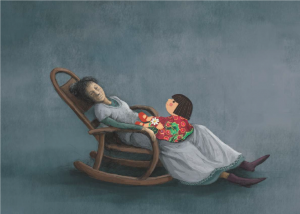On Loss and Introducing Children to Heavier Subjects Through Books
Loss is a topic often circumvented even among adults, let alone with children. It makes sense, in a way—if it’s so painful for even adults to talk about, why introduce it to children? However, doing so is possibly one of the best things a parent can do to equip their child with the tools required to deal with the death of a loved one.
Familiarizing children to the concept of death can lead to them accepting it much sooner. Chances are they’ve already happened upon it—characters die in stories, movies and cartoons. However, it is important to expose them to media that portrays death as something personal—as loss—and not simply a plot device or a villain’s deserved comeuppance. Media of the former type is a harmless, healthy way of introducing children to loss, and allowing them to sympathize with the mourning character and observe how they process their grief.
An example is Fatima from Karadi Tales’ Letters to Ammi. This poignant epistolary by Aftab Yusuf Shaikh features photographs by Adrija Ghosh and Soumitra Ranade from each place in Delhi visited by Fatima while writing letters to her deceased mother. Fatima’s pain is not obvious to the reader until the last few letters of the book, but her love and longing for her mother are striking. Knowing how deeply Fatima misses her makes the reader feel even more deeply for the heartbroken girl at the end of the book.
It is natural to feel pain at the loss of someone dear, even years after the original incident. Letters to Ammi makes the young reader aware of this, and sensitizes them to the feeling of missing someone they’ll never see again. But it also softens the blow by showing them that this pain is survivable. Fatima, her Abba, her aunt and uncle all live full lives that are not defined by their pain. It’s important for children to know that though the pain of loss might not disappear, one can successfully move on from it.

Maria L. Denjongpa’s The Truth about the Tooth teaches us more about loss. Tashi’s mother passes away, but not before showing Tashi the power of her faith, which turns a dog’s tooth into the Buddha’s tooth.
“Your Ama had no doubt in her mind that the tooth was the Buddha’s. So that’s what it became,” the oldest Buddhist lama says in the book. By the end of the book, Tashi remembers his Ama not by the pain her death caused him, but with gratitude and love for showing him how powerful faith is. This shows that our memories of loved ones who are no longer with us do not have to be shrouded entirely in pain, even though some measure of it is inevitable.

We encounter a curious case of loss in Cao Wenxuan’s Daisy Dolls. To any outsider, doll-maker Hua’s dolls are clearly not living beings, but to Hua herself, “each of her dolls was like her own child.”
When she gives away the doll she’d held closest to her heart, she has no other dolls left, and her bereavement follows her into sleep—she dreams that her dolls come back to her and talk to her as she holds them close. Daisy Dolls tells children that grief and mourning aren’t only for the living beings we lose. Sometimes we pour our souls into our creations and possessions, and their loss can affect us just as deeply.
To talk about loss with children is to make clear that death and loss are not taboo topics. When adults shy away from certain topics, children pick up on it instinctively and bottle up their feelings on them—they assume these are not things that should be openly spoken about. Instead, when adults approach these subjects with tact and practicality, children adopt the same attitude and are able to better process the death of a beloved pet or person, or even simply the idea of death, because it is no longer something they “shouldn’t” talk or think about.
No matter how one looks at it, loss is a delicate topic. But breaching it does not have to be the unassailable monster we picture it to be. With a little discernment and sensitivity, we can assist children in understanding the difficult feelings that accompany the death of a loved one—or even just the thought of it—and ultimately help them accept the circle of life for what it is.





